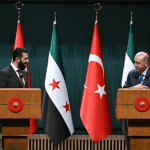Statements coming from Dr. Abdullah Abdullah, President Ashraf Ghani, and more importantly the Taliban expressing that the highly anticipated and much awaited intra – Afghan talks between the Taliban and government may finally be taking place. These are, after all, a key component of the peace process that has been designed in order to bring stability to Afghanistan. The fact that the Taliban have expressed willingness to engage with Kabul is a significant development considering the fact that they have refused to engage with Kabul in the past, including in recent weeks. According to the US-Taliban agreement of February 2020, intra Afghan talks were meant to begin on march 10, 2020, and it has since been unclear if these would ever begin.
While no specific date has been given, it is evident that the groundwork has already begun in anticipation of the much-needed talks, such as the appointment of Dr Abdullah Abdullah as Chairman of the High Council for National Reconciliation (HCNR), who will spearhead the Afghan peace process on Kabul’s behalf. Moreover, like the previous 3-day Eid ceasefire by the Taliban from May 24-26,2020, the group have declared another 3-day ceasefire in respect of Eid ul Azha.
So while certain steps are being made in the right direction, issues revolving the release of Taliban prisoners continues to be a contentious issue. While the Taliban claim to have fulfilled their part of the US-Taliban deal, by releasing all the 1,000 Afghan government prisoners, the Afghan government is yet to fulfil its side by releasing 5000 Taliban prisoners. Time and again President Ghani has caused unnecessary delays in the release of Taliban prisoners which has led to a delay in the Intra-Afghan talks. According to the Afghan government, so far 4,600 Taliban prisoners have been released including the recently freed 500 Taliban prisoners in response to the group’s three-day ceasefire announcement. The fate of the remaining 400 prisoners remains unclear although President Ghani has said that a Loya Jirga will be convened to discuss their release.
While news of intra Afghan talks is no doubt a much needed move in the right direction, it is only the beginning of a highly sensitive and complex process that will require patience and compromises from all sides. After all, as the recent past has shown us, the highs can quickly be replaced by the lows. Hence, a number of hurdles continue to stand in the way of peace.
While the Taliban finally appear to have abandoned their previous rigidity of not engaging with Kabul at all, their reluctance to abandon or reduce violence against Afghan forces continue to be a stumbling block in the way of peace. Sustained efforts on all fronts must thus be carried out before optimism can take over.
Due to the language /clauses of the US-Taliban deal in which there was mention that international forces would not be targeted, the Taliban have halted such attacks against international forces. However, they continued to target government forces. For any meaningful progress towards peace, they will have to revisit this strategy, and realize that they can no longer rely on violence as a means to further their goals. If the Taliban truly want peace, they must honour their commitment across the board and not differentiate between those they can kill, and those they cannot. Their justification for attacking government forces is in the end rather weak, since no attack can be condoned. Moreover, they must begin to see the government as an equal stakeholder. If they can accept the US – their erstwhile primary enemy – it is not far-fetched to imagine that they can, and should, also accept the government as an equal.
This is a historic opportunity for the Afghans to rewrite history. For the Taliban this presents a unique and timely moment as well since the group has gone through war fatigue, and must also desire an end to the decades of bloodshed. In fact, it can also present itself as a responsible and mature stakeholder and secure for itself a legitimate place and position in the Afghan polity, which is not something that was always on the cards. At the same time, Ghani and Abdullah also have a chance to play active and meaningful roles to deliver peace to the masses who have waited for far too long and gone through much violence and trauma. All the ingredients for a peace deal are in place; it is up to the stakeholders to now show themselves as both ready for it and willing to work hard for it to succeed.
Moreover, the US being a major stakeholder and signatory of the deal has a responsibility as well. It must push all sides to fulfil their side of the agreement and ensure a credible and workable agreement, an agreement that is acceptable to all stakeholders, and one that is for the benefit of the Afghan people. As has been witnessed in the past, haphazard and hasty compromises that are prone to collapse need to be avoided at all costs. Instead, Washington will need to play a proactive role, ensuring it allows the Afghans to come up with their own plans, and know when to intervene and put pressure on all sides, particularly the Taliban regarding a reduction and eventual halt in attacks. Washington will have to make sure that the Afghan government does not create hurdles in the implementation of the agreement such as causing delays in the exchange of prisoners or in the intra –Afghan talks as it has done in the past.
An important concern that has been missing so far from the entire discourse about the peace process has been any question of national and social healing as well as national reconciliation and reintegration. Afghanistan needs concrete steps on those fronts. Political and national reconciliation have time and again continued to pose challenges in pursuing peace talks with the Taliban, thus highlighting that the biggest threat is not external but internal. Strategies involving civil society, government bodies, and external support, must all accompany any political moves for peace. The ownership and desire for this must come from Afghans themselves, and the political leadership must provide the support, basis, and platform. Afghans have to try and overcome the past, as bloody and difficult as it may be, and sometimes forget previous enmities, focusing instead on creating a new history for themselves that has to be based on inclusiveness. For this to happen though, Kabul and the Taliban have to move beyond petty politics and think about the people of Afghanistan who have suffered for far too long, and whom they both claim to represent. The need of the hour is for all Afghans to unite and call for a peaceful and stable future. Without this, the potential that keeps being touted – of minerals, of strategic geographical location for the region, as conduits for South and Central Asia, will all be moot points.
While the results of intra-Afghan talks will only start to show themselves later, it is important to recognize their occurrence as historic. After all, this will be the Taliban meeting the Afghan government for the first time since 2001. Important questions need to be answered, primarily about what will be the desired outcome of the talks.
Now that intra Afghan talks are finally on the verge of occurrence, critical aspects essential for peace that were overlooked in the US-Taliban deal need to be addressed and focused in the upcoming intra-Afghan talks, such as the US troop withdrawal. On its part, the US needs to ensure a responsible withdrawal, without showing undue haste. A hasty withdrawal and the consequences it could have on Afghanistan in terms of a complete collapse of the government and a civil war would make Afghanistan a perfect refuge for terrorists. However, for now any reduction in troops should solely depend on the outcome of the intra-Afghan talks.
Even though the Taliban have continued to emphasize the withdrawal of US forces, at the same time, the group has stated that they would like to have friendly ties with the US and would want the US to come back and help build the country through reconstruction and development, clearly indicating that the remaining US soldiers and contractors could continue to operate in the five military bases in Afghanistan. More importantly, this highlights the Taliban’s subtle inclination for accepting US presence in the country on their terms. However, for now any reduction in troops will solely depend on the outcome of the intra-Afghan talks.
Ceasefire remains the most difficult pre-requisite for any durable peace process. Therefore, securing a sustained ceasefire that holds should be the main focus of the upcoming intra-Afghan talks.
Counter-terrorism guarantees by the Taliban have been a critical condition of the US for any peace deal, and for most of its part have been achieved. The Taliban have not been collaborating with any terrorist group, and this has been exemplified by their resistance to the Islamic State of Khorasan Province (ISKP) in Afghanistan, with whom they have been engulfed in a bloody fight against the ISKP since the Daesh’s emergence in Afghanistan as early as 2014/2015.
So far, little to no progress let alone discussion has been made on what kind of a political set up Afghanistan would have in the future, post intra-Afghan talks. Hence it is essential that the future political set up, power sharing arrangements between different political factions, constitution of Afghanistan, rights of women are sincerely addressed in the intra –Afghan talks and not overlooked as they were in the US-Taliban deal. Without addressing such pivotal questions, the talks will be an exercise in futility. It is Washington’s responsibility to ensure relative stability before they exit – including the creation of an inclusive political setup acceptable to all.
One option could be to push for the continuation of the current political structure and accommodate the Taliban in it. Another option could be an inclusive interim set up – an idea that was largely supported by all the different Afghan political factions in the Moscow talks (2018).
Afghanistan has suffered for decades from war, political instability and corruption. This new challenge of COVID-19 which has already claimed more than 1200 lives is a huge test for the political leadership of the country, and an opportunity for Afghans to come together, accommodate each other and take a chance on peace. The aim now more than ever, should be to focus on achieving peace in Afghanistan. As a starter and positive gesture, the Taliban must demonstrate a visible reduction in violence, not as a means of weakness or surrender, but rather as an opportunity to further their cause through political engagement. This should be accompanied by the upcoming intra-Afghan talks, which should lead to a timeframe for a gradual and responsible troop withdrawal, leading to a sustained and credible ceasefire that is not prone to collapse.













